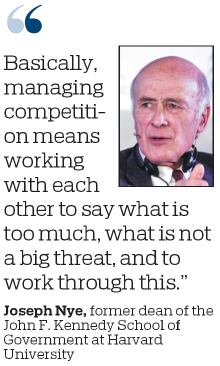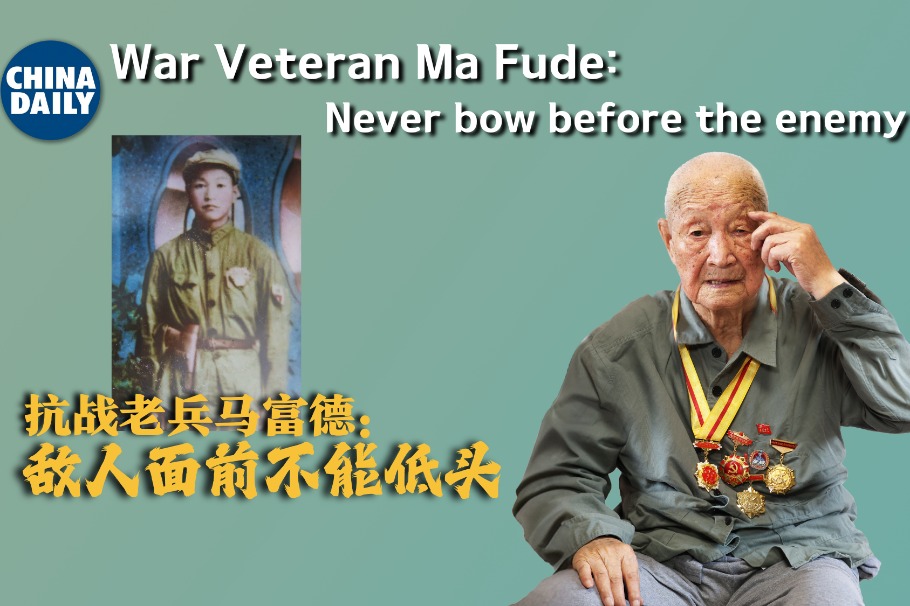'Competitive coexistence' in ties suggested
Collaborative approach mooted for Washington, Beijing to resolve issues

ASPEN, Colorado — The United States and China should set limits for competition and strive to find areas where collaboration is possible, the world-renowned US political scientist Joseph Nye says.
"What worries me about the current period is that we are focusing too much on the rivalry and not enough on the cooperation," Nye said on the sidelines of the Aspen Security Forum held over four days last week.
Nye is a former dean of the John F. Kennedy School of Government at Harvard University, where he now holds the title of dean emeritus. He is widely considered one of the world's most influential scholars in international relations. He is also known for coining the term soft power.
Nye described the current relationship between China and the US as "cooperative rivalry". In other words, he said, the two countries are now involved in "competitive coexistence".
Some aspects of their ties require the two to take a collaborative approach in dealing with one another, he said.
"The US and China are not an existential threat to each other."
Both countries are "too big" for either one to "change or invade" the other, he said.
"In that sense, we need to think of a framework which sets limits on the competition and also (enables the two sides) to look for areas where it's possible to have cooperation.
"Basically, managing competition means working with each other to say what is too much, what is not a big threat, and to work through this."
Managing China-US relations, which have been in decline for more than 10 years, will require more contacts than the two countries have had since US President Joe Biden took office two and a half years ago, he said.
"That's why I thought the decision by President Xi (Jinping) and President Biden at (G20) Bali (summit in Indonesia in November) to restore more contacts at a high level was very important."
US Secretary of State Antony Blinken, Treasury Secretary Janet Yellen and Special Presidential Envoy for Climate John Kerry have made back-to-back visits to Beijing in recent weeks, which Nye said were "absolutely" important but nonetheless "can't change the relationship overnight".
Ups and downs in China-US relations have followed a cyclical pattern since 1949, he said, each cycle lasting about 20 years.
"We are 10 years into a difficult period. You don't turn that around in just a few visits, but I think over a longer period we should be able to turn it around."
Regarding the agreement between the two countries to resume people-to-people exchanges involving businesses, students and scholars, as well as to increase direct flights to facilitate those exchanges, Nye said these are "first steps in the right direction", without which the many thornier problems will be harder to solve.
"It's also important that for symbolic purposes we develop some areas where we can educate our publics that there is something we can gain from cooperation."
Areas of cooperation
As examples he cited areas such as combating climate change, tackling drug trafficking, maintaining the stability of the world economy and safeguarding the nuclear nonproliferation regime.
"If all the discussion in Beijing and in Washington is about how the other country is a threat, (the narrative) becomes reinforcing."
However, if "we show cooperation, that begins to change the climate of ideas in Washington and Beijing".
Beginning in 1964, Nye's teaching and research career at Harvard was interrupted by two relatively brief periods of government service. From 1977 to 1979 he was deputy undersecretary of state for security assistance, science and technology, and between 1993 and 1995 he served first as chairman of the National Intelligence Council and then as assistant secretary of defense for international security affairs.
Nye said that as both "large and successful countries", China and the US "are going to have to live with each other for as long as we can" and that there will never be such a "victory in which one side wins over the other".
"Victory will mean that we both avoid a violent conflict. That's a victory for both."
Xinhua

Today's Top News
- Beijing slams Washington's treatment of Chinese students
- Xi to attend SCO Tianjin Summit, host relevant events
- AI role key in stimulating consumption
- Discovering truths about happiness on roof of world
- 60 years of progress marked
- The prospects for Cambodia-China cooperation






























